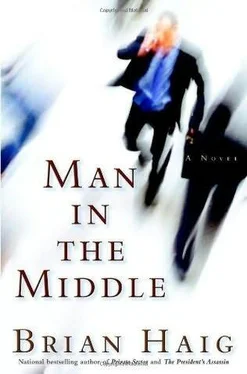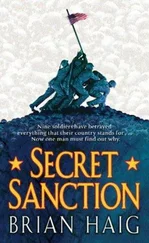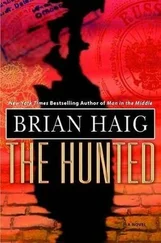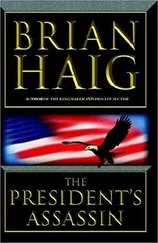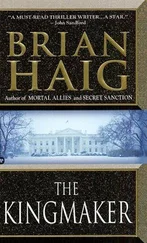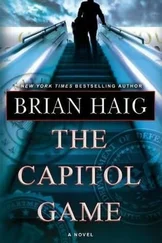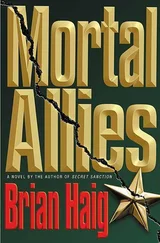Brian Haig - Man in the middle
Здесь есть возможность читать онлайн «Brian Haig - Man in the middle» весь текст электронной книги совершенно бесплатно (целиком полную версию без сокращений). В некоторых случаях можно слушать аудио, скачать через торрент в формате fb2 и присутствует краткое содержание. Жанр: Триллер, на английском языке. Описание произведения, (предисловие) а так же отзывы посетителей доступны на портале библиотеки ЛибКат.
- Название:Man in the middle
- Автор:
- Жанр:
- Год:неизвестен
- ISBN:нет данных
- Рейтинг книги:4 / 5. Голосов: 1
-
Избранное:Добавить в избранное
- Отзывы:
-
Ваша оценка:
- 80
- 1
- 2
- 3
- 4
- 5
Man in the middle: краткое содержание, описание и аннотация
Предлагаем к чтению аннотацию, описание, краткое содержание или предисловие (зависит от того, что написал сам автор книги «Man in the middle»). Если вы не нашли необходимую информацию о книге — напишите в комментариях, мы постараемся отыскать её.
Man in the middle — читать онлайн бесплатно полную книгу (весь текст) целиком
Ниже представлен текст книги, разбитый по страницам. Система сохранения места последней прочитанной страницы, позволяет с удобством читать онлайн бесплатно книгу «Man in the middle», без необходимости каждый раз заново искать на чём Вы остановились. Поставьте закладку, и сможете в любой момент перейти на страницу, на которой закончили чтение.
Интервал:
Закладка:
About fifteen yards separated us; they had five guns, we had one. The space was narrow and enclosed, and if this was a shooting gallery, the Kewpie doll was theirs for the taking.
None of the Saudis replied; but nobody made a threatening gesture either, which was a relief. Bian said, "Let me try." She unreeled something in rapid-fire Arabic and the five men stared back without responding. Bian repeated herself, louder, more slowly, and more emphatically. One of the Saudis replied, in Arabic, and what ensued was a conversation, brief and sharp, and nobody put down their weapons and nobody raised their hands.
Bian informed us, "The man is telling us to relax. He says they're the good guys. He says we're on the same side."
"We're not on the same side," I told her.
"No shit."
"Tell them they're under arrest."
"Don't," said Tirey, who pointed out, "They're not American nationals. I don't have the legal authority to arrest them." He whispered, more ardently, "For Godsakes, don't put them in a corner. We're outnumbered."
Good point. But I don't like impasses, unless I'm the source and it's to my advantage. The man who had spoken with Bian seemed to be in charge and I approached him with my palms extended. This was my prisoner they murdered. Bian and I had risked our lives to get this guy, now for nothing. I was pissed, but I wasn't armed, and as Tirey pointed out, there were more of them than us. Clearly, here was a situation that called for adroit diplomacy.
He watched me approach and edged backward a few steps, away from me and toward his group. I stopped about two feet short of him, near enough that I could smell menthol cigarettes on his breath, and near enough that I could be on him before he squeezed the trigger. I gave him a friendly smile. He smiled back. I laid a chummy hand on his shoulder and squeezed, very gently. He sort of relaxed. I landed a hard punch in his solar plexus, a popping sound came from his throat, his weapon dropped to the floor, and he fell to this knees, gasping for breath-as a prelude to diplomacy I thought it was important to clarify that we weren't on the same side.
I took a step back and regarded the faces of the other men, and I noted that they shared this insight, because now four pistols were directed at me. Well… so much for diplomacy. I said, "Lay down your weapons. Now."
This is what's called a tense moment. All it took was one misjudgment, and studying their faces, I detected at least two guys who looked mistake-prone.
But at that instant, five Americans, guns drawn, came sprinting around the corner. We must've passed a panic button on our way down here, and Tirey had apparently exercised good foresight and punched it. Sounding relieved, Tirey said to Bian, "Tell them it's over," and he ordered his people, "Take their weapons and cuff them."
Bian said something in Arabic, the Saudi guards saw that the jig was up, and one by one they lowered their weapons and placed them on the floor. This was good, because they had all been pointed at me.
But clearly, the hermetic seal around this operation was now blown. In the next few minutes everybody inside this facility was going to know about Ali bin Pacha, and his death would be the topic du jour for weeks. Murder-it upsets even the best-laid plans. Bian asked Tirey, "Where's bin Pacha's cell?"
"Over here."
We rushed to the cell, though there was no real need to hurry, and Tirey poked a button on the wall that electronically unlocked the metal door, which he threw open. We entered a room that felt immediately claustrophobic, and on the door at about head height I noted a three-inch barred opening-this would be the aperture through which bin Pacha had his brains blown out. Already, the pungent, metallic smell of fresh blood filled the air and our nostrils.
A dark hole was in bin Pacha's temple, and as I looked around at the flesh and blood spattered on the floor, my first instinct was to get medical assistance, though obviously a janitor made more sense.
Bian's first reaction was to bend over, check his pulse, and then verbalize what had occurred. She said, "He's dead. Those bastards assassinated him. They didn't want us to hear what he had to say."
Tirey, now gawking at bin Pacha's corpse, observed, "This… this Saudi arrangement… this was… you know, the CIA's bright idea." He looked at me, and it dawned on him that I was part of the Agency brotherhood. "It did… it originated with your people. I… I merely followed orders and…" He drifted off to a corner of the cell.
His first instinct was to cover his butt, and at the same time to get his beloved Bureau off the blameline. Somebody was going to be held accountable for this, either the CIA or the FBI, and the early bird was already humping the worm.
Actually, he looked badly shaken-I didn't blame him-and I approached him, squeezed his arm, and reminded him, "This is a crime scene. Treat it as one."
"Uh…" He looked around the cell, trying to decide his next move.
I asked, "Was the killing recorded?"
He stared back and did not reply.
I repeated the question.
"Uh… no. As I mentioned, the video feed from the cell… it was, well… disconnected from the central control room. The sessions in the interrogation room… we only intended to record those."
He looked unhappy to confess this, and I looked even unhappier to hear it. I said, "All right. This was a close-range shooting, right? Probably there's blood splatter on the weapon, probably fingerprints on the trigger, and definitely there will be powder residue on the hand of the shooter." I squeezed his arm again. "Jim… Find the killer."
He looked at me, and in true Bureau spirit said, "I… This is going to be really sensitive. I have no legal authority over the Saudis."
"Do you think you're building a case for an American court? Screw the legal niceties." I pointed at bin Pacha's corpse. "They did."
"Okay, yeah." He stepped back into the hallway and fell into the groove, ordering his people to separate the prisoners, even as he dispatched a man upstairs to retrieve a crime kit.
Bian started to say something, but I placed a finger on her lips. I pointed up at the light fixture.
I removed my finger from her lips. She took a deep breath and exhaled, "It was all for nothing, Sean. Everything… for nothing."
CHAPTER THIRTY-TWO
Here's a sad fact about a land where death by violence is ubiquitous: The aftermath machinery works with stunning efficiency.
Ali bin Pacha's body was bagged, tagged, and deposited in the base morgue-a long metal shelf in a refrigeration van sequestered from the dining facility. The Saudi weapons were all collected, dusted, and tested for powder residue. Simultaneously, the five Saudi guards and the two agents planted in the bordering cells were interrogated by linguists, fingerprinted, swabbed for powder traces, and then locked, individually, into separate cells.
All of which is SOP whenever conspiracy is a factor, and in this case it was a waste of effort, time, and cell space. We had to assume this was a coordinated conspiracy run by professionals; ergo, the Saudis had been prepped and rehearsed long before we laid eyes on them. Still, after a big screwup everybody pays painstaking attention to procedures they should've obeyed before. Human nature. I do it.
Regarding me, for nearly forty minutes, Tirey's people forced me to recount, over and over, what I had observed. This also is SOP, having the witness repeat the story as you look for flaws, deviations, omissions-anything that indicates the witness isn't reliable, or overlooked an important detail, or isn't credible. There were no deviations-bin Pacha was dead, we had been caught with our pants down, and now everybody was scrambling to figure out how, and why. But the subtext here was who should be blamed, rather than who did the crime.
Читать дальшеИнтервал:
Закладка:
Похожие книги на «Man in the middle»
Представляем Вашему вниманию похожие книги на «Man in the middle» списком для выбора. Мы отобрали схожую по названию и смыслу литературу в надежде предоставить читателям больше вариантов отыскать новые, интересные, ещё непрочитанные произведения.
Обсуждение, отзывы о книге «Man in the middle» и просто собственные мнения читателей. Оставьте ваши комментарии, напишите, что Вы думаете о произведении, его смысле или главных героях. Укажите что конкретно понравилось, а что нет, и почему Вы так считаете.
